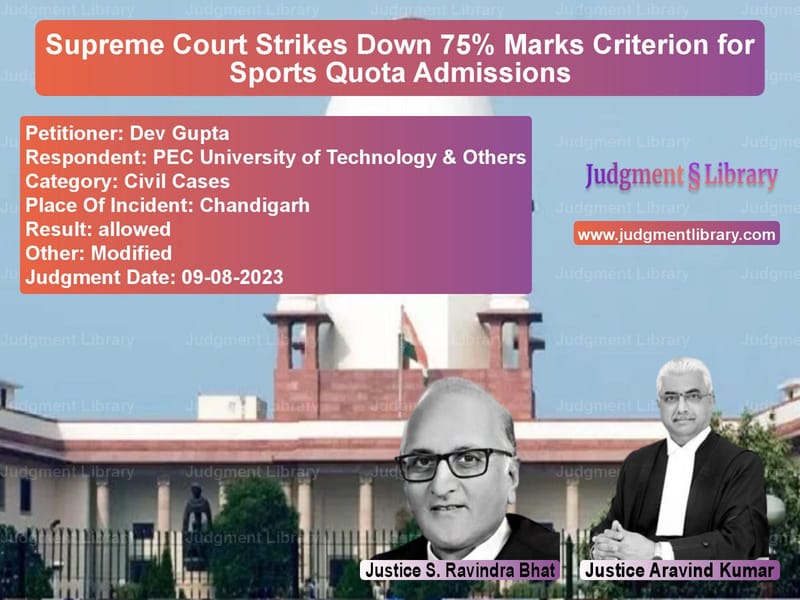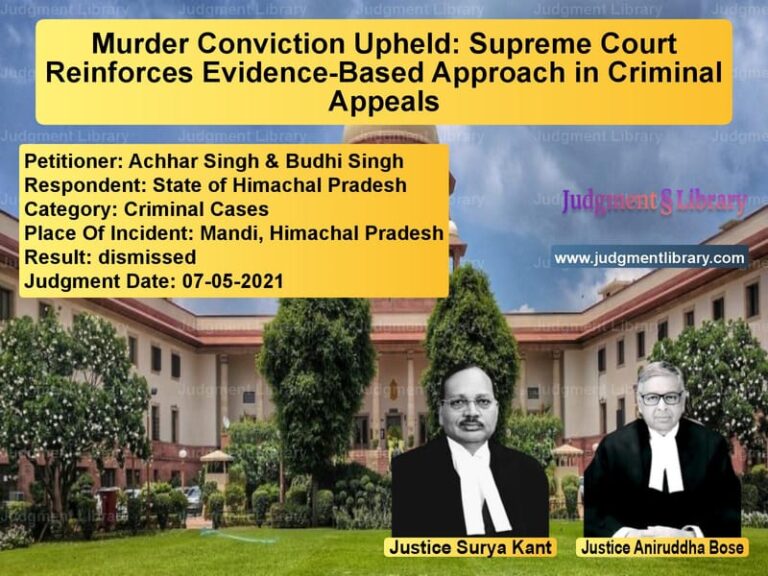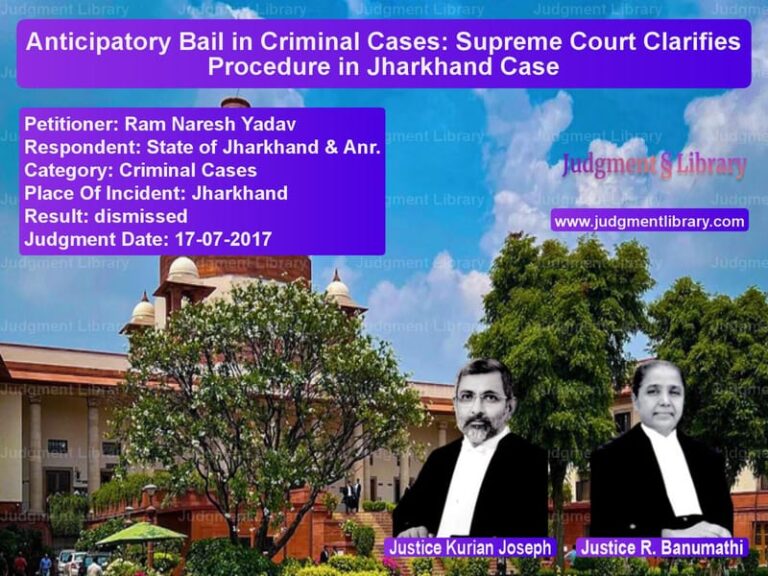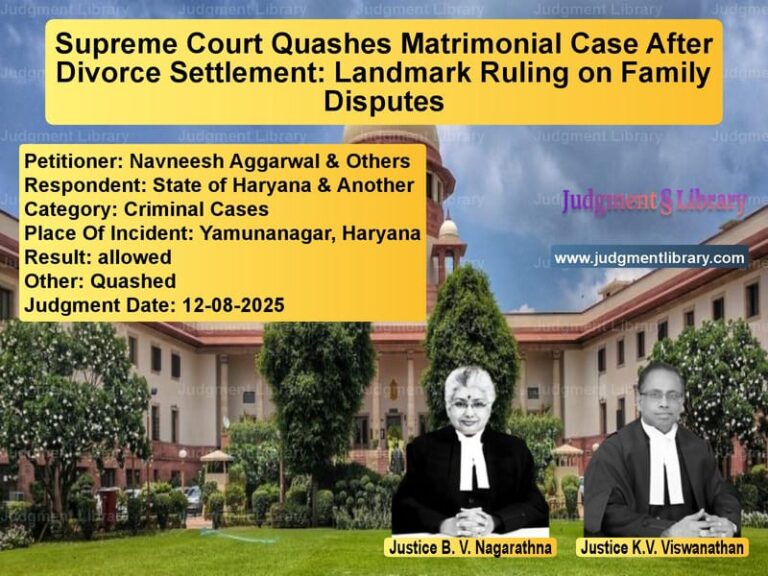Supreme Court Strikes Down 75% Marks Criterion for Sports Quota Admissions
The Supreme Court of India has delivered a significant judgment in the case of Dev Gupta v. PEC University of Technology & Others, ruling that the imposition of a minimum 75% marks eligibility criterion for admission under the sports quota was arbitrary and unconstitutional. The Court set aside the Punjab & Haryana High Court’s order, which had upheld the university’s policy, and directed that sports quota seats be filled based on the existing sports policy criteria rather than academic performance.
Background of the Case
The appellant, Dev Gupta, had applied for admission to an engineering course at PEC University of Technology under the 2% sports quota. However, his application was rejected because he did not meet the newly introduced requirement of securing a minimum of 75% marks in the Class XII examination. The appellant challenged this criterion in the Punjab & Haryana High Court, arguing that it was arbitrary and defeated the very purpose of the sports quota. However, the High Court dismissed his writ petition, leading him to appeal to the Supreme Court.
Key Issues in the Case
- Whether the imposition of a 75% marks criterion for sports quota candidates was legally valid.
- Whether the university’s admission policy violated Article 14 of the Constitution, which guarantees equality before the law.
- Whether the university’s decision was arbitrary and defeated the purpose of the sports quota.
Arguments by the Petitioner (Dev Gupta)
The appellant’s counsel, Senior Advocate P.S. Patwalia, made the following arguments:
- The sudden imposition of a 75% marks requirement for sports quota candidates was arbitrary and unreasonable.
- The purpose of a sports quota is to promote excellence in sports, and expecting candidates to achieve high academic scores alongside rigorous sports training was unfair.
- The university had never imposed such a high marks requirement for sports quota candidates in previous years.
- Other reserved categories, such as SC/ST candidates, had a lower eligibility requirement of 65%, which indicated inconsistency in policy application.
Arguments by the Respondents (PEC University of Technology & Chandigarh Administration)
The university and Chandigarh Administration defended the eligibility criterion, arguing:
- The 75% marks criterion ensured a minimum level of academic excellence among all candidates.
- Out of 34 applications for the sports quota, 28 candidates had secured more than 75% marks, demonstrating that the requirement was reasonable.
- The admission process had almost been completed, and any changes at this stage would disrupt the allocation of seats.
- The eligibility criteria for previous years had also included a 75% cutoff for general category admissions, aligning with national admission policies.
Key Observations by the Supreme Court
1. The Purpose of the Sports Quota
“The objective of introducing the sports quota was to promote and encourage those who achieved a certain degree of proficiency in competitive sports. The introduction of this quota was to ensure representation of sports persons, not to enforce academic merit at par with general category candidates.”
The Court emphasized that the intent behind sports reservations was to support athletes, not to burden them with high academic standards.
2. Discriminatory Application of the Policy
“The university has made an exception for SC/ST candidates, allowing them to qualify with 65% marks. However, sports quota candidates, despite their distinct merit, are being subjected to an unjustified and higher standard. This is inherently discriminatory and fails the test of reasonable classification under Article 14.”
The Court held that the university’s policy was inconsistent and lacked a rational basis.
3. Past Precedents and Sudden Changes
“For several years, the qualifying marks for sports quota candidates were set at a much lower threshold. For three academic years (2020-21, 2021-22, and 2022-23), the eligibility requirement was merely passing Class XII. The sudden hike to 75% is arbitrary and unjustified.”
The judgment noted that the university had not provided a sound rationale for the abrupt policy shift.
4. Impact on Sports Development
“Imposing an excessively high academic threshold on sports quota candidates would discourage young athletes from pursuing excellence in sports, undermining the very objective of the reservation.”
The Court highlighted that universities play a crucial role in nurturing athletes who represent the country at national and international levels.
Final Judgment
The Supreme Court ruled:
“The impugned order of the High Court is set aside. The imposition of the 75% minimum marks criterion for sports quota candidates is arbitrary and discriminatory. The remaining seats under the sports quota shall be allocated based on the criteria set in the previous academic year.”
The Court directed the university to fill the remaining sports quota seats within two weeks using the existing sports policy standards rather than the newly imposed 75% marks criterion.
Conclusion
The Supreme Court’s judgment in Dev Gupta v. PEC University of Technology & Others is a landmark ruling reinforcing the importance of fair and reasonable classification in educational admissions. The ruling ensures that sports quota candidates are assessed based on their sporting achievements rather than being subjected to the same academic benchmarks as general category students. This verdict not only upholds the principles of equality under Article 14 but also strengthens the framework for supporting sports development in India.
Petitioner Name: Dev Gupta.Respondent Name: PEC University of Technology & Others.Judgment By: Justice S. Ravindra Bhat, Justice Aravind Kumar.Place Of Incident: Chandigarh.Judgment Date: 09-08-2023.
Don’t miss out on the full details! Download the complete judgment in PDF format below and gain valuable insights instantly!
Download Judgment: dev-gupta-vs-pec-university-of-te-supreme-court-of-india-judgment-dated-09-08-2023.pdf
Directly Download Judgment: Directly download this Judgment
See all petitions in Education Related Cases
See all petitions in Public Interest Litigation
See all petitions in Judgment by S Ravindra Bhat
See all petitions in Judgment by Aravind Kumar
See all petitions in allowed
See all petitions in Modified
See all petitions in supreme court of India judgments August 2023
See all petitions in 2023 judgments
See all posts in Civil Cases Category
See all allowed petitions in Civil Cases Category
See all Dismissed petitions in Civil Cases Category
See all partially allowed petitions in Civil Cases Category







